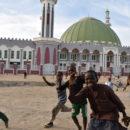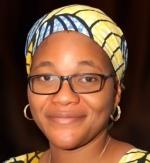Sudan: Trump’s deal could be disastrous. Biden can fix it.

Instead of undermining Sudan’s democratic transition and drawing it into regional conflicts, a reconfigured US-Sudan deal could do the opposite.

The Trump deal made Prime Minister Abdalla Hamdok look weak and may have emboldened militant and Islamist figures. A new approach could instead support the civilian authorities. Credit: International Hydropower Association.
In the weeks running up to the US elections on 3 November, President Donald Trump struck a deal with Sudan. After 27 years on the state sponsors of terrorism list, Sudan would finally be removed. In exchange, Khartoum agreed to normalise relations with Israel and pay hundreds of millions of dollars in compensation to American victims of past terrorist attacks.
The Sudanese transitional government had been working towards an agreement with the US since the ouster of former president Omar al-Bashir in 2019. The country’s designation as a sponsor of terrorism has been deeply debilitating for the economy and impeded the interim authorities’ ability to move forwards. Yet the rushed deal it got, foisted upon it by an internationally unpopular US president attempting to bolster his re-election bid and court favour with Israel, was full of pitfalls and missed opportunities.
When President-elect Joe Biden takes office in January 2021, Khartoum and Washington will get another chance. They could work together to forge a deal that is truly in both sides’ long-term interests. This will require examining and correcting three critical downsides of the Trump deal.
Supporting, not undermining, Sudan’s transition
For the Trump administration, the Sudan deal seems to have been an opportunity to assert a victory for an “American First” ideology. As such, the US leveraged its unequal power to extract headline-grabbing concessions to play to an American audience. Any actual gains from this approach, however, would likely be short-lived if not counterproductive.
Following the fall of al-Bashir, Sudan’s transition has been led by a fragile alliance of civilian and military leaders. Aware of this uncertain balance, Prime Minister Abdalla Hamdok had earlier asked the US to postpone a deal until civilian authorities had won a clear mandate in elections. Hamdok recognised the importance of asserting strength domestically especially in negotiations with the Western superpower. Islamist and militant leaders in Sudan have long used the narrative of the US, Israel and the UN being the enemy at the gates to exert influence and claim they are needed to defend the nation.
Unaware or uninterested in these dynamics, the US rejected Hamdok’s request and imposed a deal that painted him as weak and brought further division to an already divided transitional power arrangement. The concessions imposed on Khartoum were seen by many as humiliating. The PM was already viewed suspiciously by some militarists and Islamists due to his former career with international organisations, and the deal added to suggestions that Sudan’s new leader is a pawn of America and Israel.
Though no longer in power, Islamist factions and armed groups retain a significant powerbase and presence in much of Sudan’s political and bureaucratic establishment, in particular the security apparatus. Many maintain extreme views and a propensity to use violence. The one-sided Trump may have emboldened them to further undermine a weak civilian prime minister.
A Biden government could, by contrast, take note of these complex workings. It could fashion a different approach that actively supports rather than weakens Hamdok and, by extension, Sudan’s democratic transition. It could allow the civilian administration to achieve victories in international affairs and secure economic gains for the people.
A starting point for this could be to reorient from a bilateral to a multilateral approach. This would involve a wider array of perspectives and interests and would make it harder for Sudanese Islamist or militarists to argue that any reforms that come as part of a deal are simply American dictates. The US could also take care to ensure local ownership and leadership of reforms by empowering and helping to fund Sudanese-led civil society organisations – especially Islamic charities – that share the goal of democratisation.
Resolving, not egging on, regional rivalries
The Trump deal also betrayed narrow self-interest and short-term thinking in the way it approached Sudan’s regional role. Khartoum has been trying to balance relations with its neighbours, particularly in maintaining a relationship with both Egypt and Ethiopia, and both Saudi Arabia and Iran. In making the deal, Trump clearly attempted to draw Sudan towards his own allies. In his publicised conversation with Hamdok, the US president explicitly criticised Ethiopia’s position on the Grand Renaissance Dam and sided with Egypt’s President Abdel Fattah al-Sisi. Meanwhile, it was arranged that part of the compensation Sudan would have to pay US terrorism victims would be covered by Saudi Arabia.
In taking this approach, the Trump administration egged on regional rivalries and attempted to pull Sudan further into taking sides. A Biden administration could take the opposing approach. Instead of focusing in on narrow perceived wins, it could see the deal as part much broader dynamics.
Regarding the issue of the Grand Renaissance Dam and the Nile waters, it could facilitate the talks that include a wider group of affected states such as Uganda and South Sudan. It could address conflict mitigation and climate change as part of discussions. And it could take into account the ways in which Sudan’s transformation is connected to the peace process in South Sudan, reforms in Chad, challenges in Ethiopia and other regional security efforts.
Rather than stoking rivalries, it could provide a forum and options to resolve them.
Human rights, not America First
A final key shortcoming of the Trump deal is that it trivialised efforts to secure justice for the human rights violations. Many advocacy groups hoped that the US would use its leverage to push the transitional government towards democratisation, inclusion and adherence to human rights. The Trump administration focused instead on concessions it believed would directly benefit a small number of Americans.
A Biden government could refocus. It could argue that economic re-engagement must be accompanied with not just elections but deeper institutional reforms in the judiciary and security sectors. It could support a war crimes tribunal to examine past atrocities and a national reconciliation process. While some called for Sudan’s delisting to be conditional on al-Bashir being handed to the International Criminal Court in The Hague, supporting the establishment of a domestic court would be a similarly important achievement.
Efforts such as these would be tricky. Sudan’s transitional authority is a tenuous accommodation and includes several individuals who are responsible for past war crimes, corruption and abuses. This is where depth of knowledge, seasoned diplomacy, and broad-based international support would prove essential.
Balancing the myriad issues facing Sudan requires far more consideration and effort than the Trump deal showed. Fortunately for Biden, the US diplomatic corps contains plenty of experience in Sudanese affairs from both Democrat and Republican backgrounds.
A new hope
When Biden takes office, both Khartoum and the US will have another chance to make a meaningful deal. In contrast to the Trump deal that mostly benefited the US president through narrowly-defined wins, a US-Sudan deal under Biden could benefit the Sudanese and American people more broadly.
For the US, it could pave the way for its private sector to return to Sudan and bring a small degree of unity among Republicans and Democrats; Sudan and South Sudan hold deep importance to groups within both camps. For Sudan, it could support the transition, contribute to peace and security in the region, and encourage democratic reforms for the coming generations.







amlodipine nursing implications norvasc medication amlodipine besylate 5 mg tab tablet norvasc for high blood pressure ’